Patrick O'Connell: 'Barcelona FC saviour' they called 'Don Patricio'
- Published
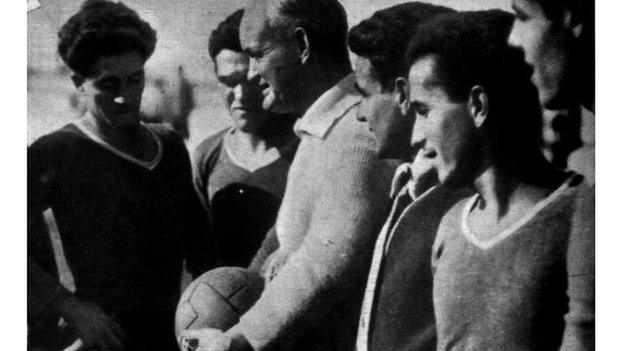
Patrick O'Connell with the Real Betis team he led to the Spanish championship in 1935
They called him 'Don Patricio' - he was the Irishman who rose through the footballing ranks from Belfast Celtic to captain Manchester United and going on to win the name of "Barcelona Saviour".
He was a legend in Spain, but died in poverty in London and lies in an unmarked grave.
The story of the rise and fall of footballer Patrick O'Connell struck a chord with football fans.
They include Belfast fans keen to nurture the city's link.
They could not let him rest unknown.
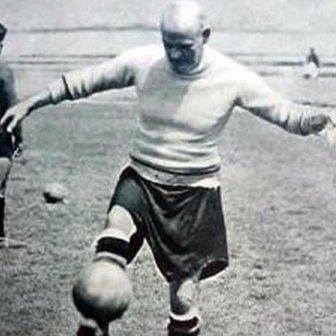
Football skills - Patrick O'Connell captained Manchester Utd
Fergus Dowd is among those who want to set up a memorial at the footballer's grave in St Mary's Catholic Cemetery, Kilburn, and to commemorate him in Belfast too.
He and his friends do not want Mr O'Connell to be forgotten.
And neither, it turns out, do many of those who share his love of the beautiful game.
Johan Cruyff, Oliver Kahn, Martin O'Neill, Franz Beckenbauer and Luis Figo want Mr O'Connell's memory marked too.
But who was Paddy O'Connell?
He was a man from Dublin who won his first professional contract with Belfast Celtic.
He moved to Sheffield Wednesday, Hull City and on to Manchester United, three months before World War I broke out.
There were stories about his talent - he played for Ireland and captained the team to victory even as he was playing with a broken arm.
Much remembered
And later, he disappeared to Spain.
It was there that he is much remembered and much loved - as he managed Racing Santander, Real Oviedo and Real Betis Balompie.
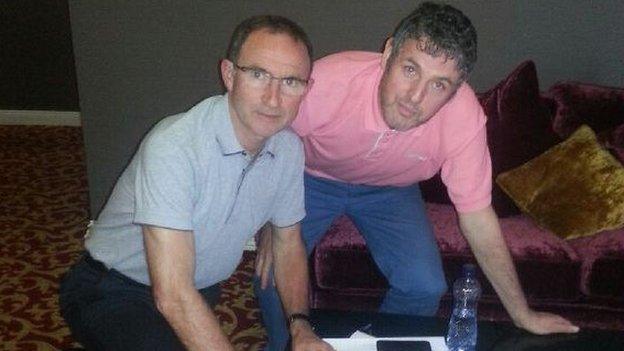
Republic of Ireland manager Martin O'Neill backs Fergus Dowd's campaign
Under Don Patricio - as the Spanish called him with great affection - Betis moved up the ranks from the second division in 1932 to three years later, going into the last match of the season one point ahead of Real Madrid at the top of the table.
It was the stuff of dreams. Betis romped home 5 - 0. David took on Goliath and the result was history.
And on went Don Patricio, joining Barcelona just before the Spanish Civil War broke out.
Exile
The club was so associated with the republican cause that it almost folded under the pressure from General Franco's forces.
But in 1937, Mr O'Connell led the team into exile on a tour of Mexico and New York.
The money raised on the odyssey was used to revive the team's fortunes.
He became known as the saviour of Barcelona.
Mr O'Connell left shortly afterwards. Years later, in 1954, his old glory team, Betis heard he had hit hard times and arranged a benefit match.
The last years were hard. In London, he died of pneumonia in 1959. His grave remains unmarked.
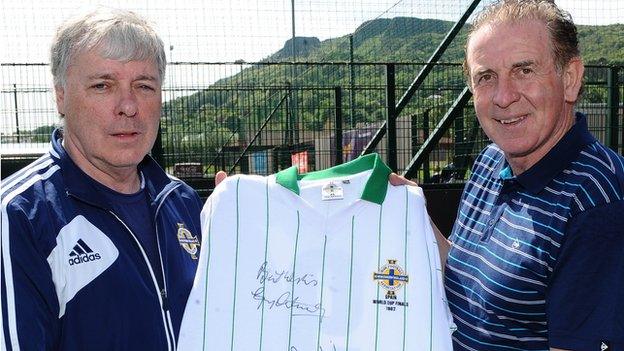
Former NI footballers Gerry Armstrong and Mal Donaghy are supporting efforts to remember Patrick O'Connell
Fergus Dowd learned about Dublin man Mr O'Connell at his father's knee.
"I remember the story of the hero and the tragedy of his life," he said.
"Remember, without him there would be no Barcelona - no Messi, no Cruyff, no Maradona. It was O'Connell who saved Barcelona from extinction."
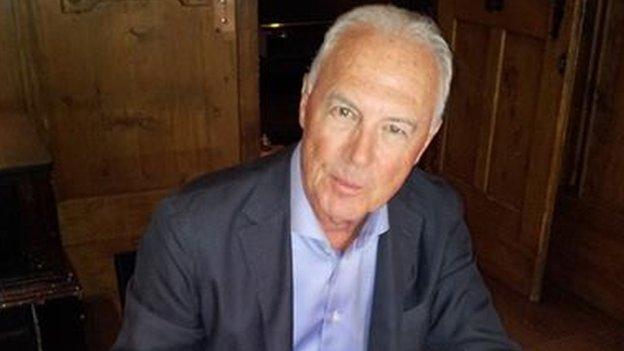
Franz Beckenbauer has lent his support to the campaign
And now a group of fans and football stars and clubs want to mark his place in soccer history in a more fitting way.
They want a memorial at his grave and a monument at the Park Centre in Belfast, Northern Ireland - scene of his first professional matches.
For Fergus Dowd, it has been amazing.
"It has been unbelievable - we've had responses from all over Europe. The top people in football have been involved," he said.
"We now have 30 signed shirts from everyone from Cruyff to Beckenbauer. Gerry Armstrong gave us his 1982 Northern Ireland jersey and we have a jersey signed by the greatest Ireland 11 - including Roy Keane."
Now, with the help of soccer players and fans, Mr O'Connell's unmarked grave at St Mary's Cemetery, Kensal Road, London will be a tribute to the man they called "Barcelona's saviour".